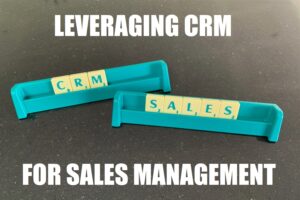One of the challenges that we hear from our prospects with alarming frequency goes along the lines of “We have a CRM system, but we’re not using it. We don’t know how to effectively manage our sales or our business processes through it.” Perhaps not the root cause, but a significant contributing factor of this seems to be suppliers of CRM software not taking an interest in the welfare and development of the businesses using their software, which sadly tar
nishes all of our reputations. This, in fact, is why we have pioneered the CRM as a Service (CRMaaS) space. But if you’re in this situation, what can you do, at the strategic level, to start the process of managing through CRM?
Understand that software is simply a framework for a CRM culture
All too often, sales managers who want results fast get caught up in “what needs to happen in the CRM system.” However, consider this – the CRM-centric culture and strategy of the business is the element that actually drives successful relationships with your customers. You should therefore be thinking about what customer information you actually need and how you do business with them, in order to help you to make informed strategic and tactical decisions.
CRM software is a brilliant tool for facilitating this, but only if you align it to your business processes and customer journey, the way you work with your suppliers, the products or services you offer and much more. Once you have carefully considered this and can explain why each piece of information is important do you have a genuine reason for your business development reps to fill in pieces of information in CRM.
Work with your team as a leader
Following on from defining what information is important to record and why, at this point an issue that can arise is the sales team just not filling the information in, and reverting back to documents, spreadsheets or worst of all, paper. There are many approaches to getting people to enter the data; some sales managers prefer carrot, others prefer stick. A leader’s approach is probably somewhere in the middle.
Spend time with your team to understand why they aren’t using it, look at how you can make the process smoother and help them understand what’s in it for them. But equally, set the expectation that there will be some compromises. It is typically not worth going to the nth degree of customisation in a CRM system because it will need to change as your business grows and develops over time anyway. Always try to use the system as you are asking them to i.e. put yourself in their shoes, as this helps to prove in their minds that you’re all in it together and that it’s not a waste of their time.
Use the information to your advantage
Once you have a foundation of trustworthy data, it’s a real possibility to start reaping the benefits of using CRM for sales management. Experienced sales managers will already know what questions need to be asked of the data, but for those who haven’t had the many years of experience required to ask relevant, valuable and insightful questions that are relevant to your industry, here are some pointers:
- Who in my team is performing best, and who is performing worst?
- What can the weakest performers learn from the top performers?
- What do they do differently, and can we make their practices part of our standard sales process?
- Do they capture information that the others do not?
- What factors do they consider early in the prospect engagement?
- How do they decide who to devote their time to?
- How often do they visit or call their customers?
- How loyal are their customers, and how do these two correlate?
- What do the buying trends look like for our customers?
- Are certain types of customers buying more than others?
- Does it vary by industry? By time of year? By size?
- Do certain products or services do better than others?
- What about them makes them more in demand?
- What features could be focussed on in new products or services to expand your footprint within existing customers, or the customer industries?
- Why did you win deals with your customers?
- Are your strengths in price, lead time, or customer service?
- Why do you lose deals?
- Are you consistently losing deals to certain competitors, or are certain customers just using you to get a lower price?
Hopefully this is building a picture of what you can aspire to and how you can get there. If, after reading this, you are still struggling to see a path from where you are now, to “CRM Maturity”, consider using an expert to guide you along that path.





